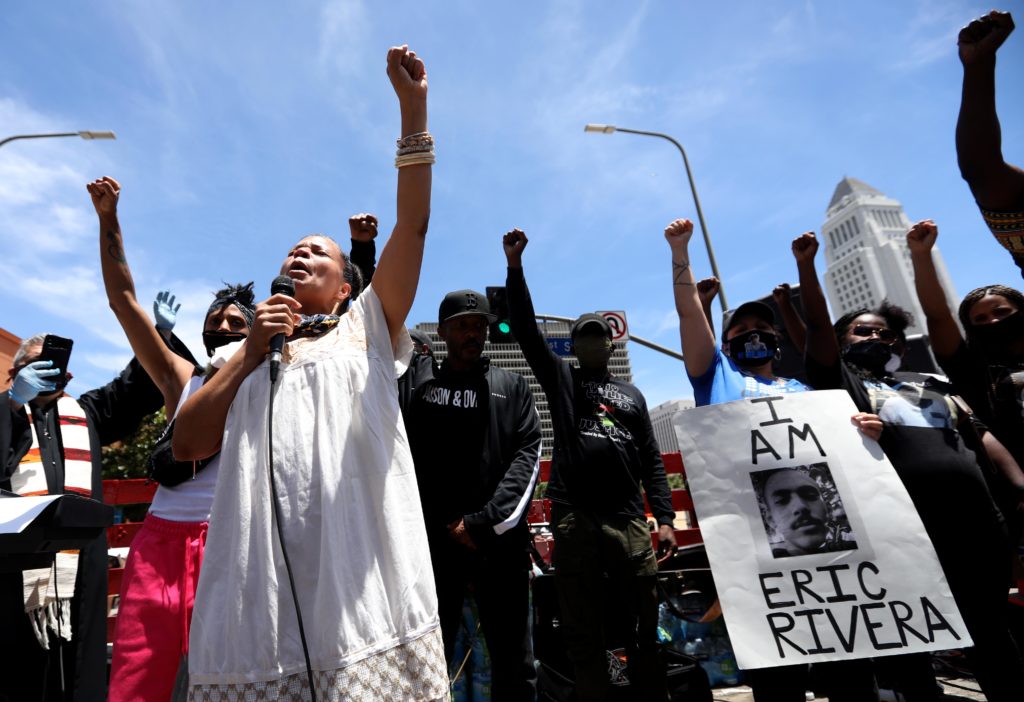Inspired by the Council’s Rachel Tanur Memorial Prize for Visual Sociology, we ask prominent scholars to select a visual artifact of this time that will help future researchers understand the Covid-19 crisis. In this installment, Kelly Lytle Hernandez (Professor and Thomas E. Lifka Chair of History, University of California, Los Angeles) spoke with Jonathan Hack (program officer, SSRC Anxieties of Democracy program) about Black Lives Matter protests and transformative structural change in how America envisions policing.

Jonathan Hack (JH): What motivated you to select this photo?
Kelly Lytle Hernandez (KLH): When the uprisings in Los Angeles began, I knew we were prepared for this moment. In Los Angeles we have a very strong Black Lives Matter chapter as well as many other abolitionist organizations. We are ready and willing to demand real change.
The movement, led largely by queer women and Black women, has been doing extraordinary work for the last six or so years. On a weekly basis, BLM-LA protests at the Los Angeles Board of Police Commissioners. These weekly acts, and others, have been building community power.
When the uprising unleashed and tens of thousands flooded the streets, the movement was ripe and ready: the infrastructure had been put in place, leadership had been assembled, and there was a strategy in place to push for transformative structural change.
JH: Do you see these protests producing structural change?
KLH: I’m hopeful. Cautiously hopeful.
JH: Why? What gives you hope?
KLH: Black Lives Matter had drafted and released a People’s Budget, prior to the uprising. If honored, that budget would radically reduce the size of the Los Angeles Police Department’s (LAPD) budget, shifting those funds to libraries, schools, and parks. Things that keep people healthy and create thriving communities and families.
The City Council did not immediately take action on this proposal. After the uprising began, they reduced the LAPD budget by $150 million, but that $150 million was simply the planned budgetary increase. In essence, they kept the budget flat, at previous-year funding levels, while giving the appearance of budgetary cuts. But, because of BLM-LA and their People’s Budget, there was a blueprint in place to demand substantial change that was the outcome of all of this work, preparation, and planning.
That said, this was an important step. It shows the next stages of the struggle: taking the fight from the streets to City Hall. And I feel confident that our [local Black Lives Matter] leadership is ready for the moment.
JH: Is there a future where police departments are responding as community-based organizations? Are structural changes possible, or will institutional stickiness prevail?
KLH: As a historian, I think the evidence is quite clear: police reform is a fool’s errand. We have tried this multiple times before, whether it be the Wickersham Commission of the 1930s, the Christopher Commission that followed the 1992 uprising here in Los Angeles, or the more recent adoption of implicit bias training, predictive policing, or big data policing, we’ve seen the same results: disproportionate and aggressive force against Black and indigenous and brown folks. Now is the time to radically reduce police budgets and to shift those funds over to the institutions and the systems that we know work, such as investing in young people, in their employment and their education.
Radical budgetary change means taking care of our elders and our most vulnerable community members, investing in mental health clinics, tending to our families, and making sure we’re addressing issues of domestic violence and abuse. It means trumpet lessons for every kid, so they can envision a new world where they fit in, where they have possibilities, and where they can dream.
Ultimately, no, I don’t think police reform is the direction that we should head in. I really think it’s about radically reducing our investments in policing and shifting those monies over, while adding new investments from other sources as well. That said, I think we’re in for a long haul. The question is how we can address, redress, and hopefully move forward with greater love and dignity for all. Unfortunately, one of the realities of the Trump administration is that he has uncorked the depths of white supremacist cultural politics in the United States. And there’s no re-corking it.
This conversation was conducted on July 15, 2020. It has been edited for length and clarity.